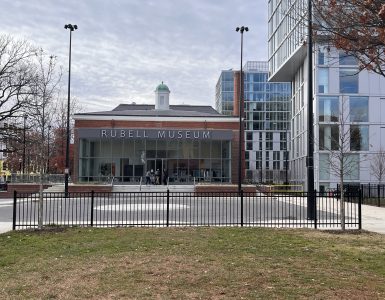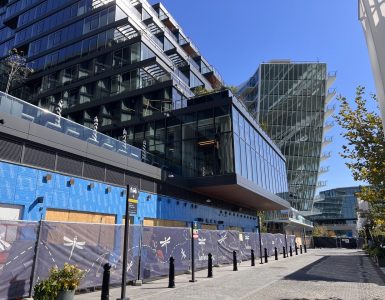When Westminster Presbyterian Church opened its first building in Southwest D.C., the nation was on the cusp of the Civil War. Now, leaders of the 165-year-old church are tearing down its second building.
Westminster Presbyterian Church is one of at least three nearby churches touched by the opening of the Wharf, a development project along the Southwest Waterfront that already includes restaurants, shops and a concert venue.
They’re replacing their current building with affordable housing units and a new church, which they hope will give longtime, low-income residents a home in their increasingly pricey neighborhood, said Brian Hamilton, one of the church’s pastors.
Nearby St. Augustine Episcopal Church and Riverside Baptist Church, however, are taking a different approach. Both struck deals with Wharf developer PN Hoffman to sell a piece of their land, bringing in much-needed cash. They used it to rebuild their churches on the remaining property.
A church must “respond to its time and changes or become an asterisk in history,” said Michael Bledsoe, pastor at Riverside Baptist Church.
Churches sell property to developers
Developer PN Hoffman was one of the companies that won the right to redevelop the Southwest Waterfront in 2006. Their neighbors near the Waterfront were long-established churches like St. Augustine Episcopal Church and Riverside Baptist Church.
Use arrows to navigate a timeline of Southwest D.C.’s history
Facing new development in their neighborhood, Riverside Baptist Church first considered selling their property in 2006, Bledsoe said. They wanted to create an endowment for the church and a more modern building that would save them money on maintenance, he said.
“I saw this as an existential challenge,” Bledsoe said. “With about 125 souls, a small bank account and maintenance needs, I could foresee the church dying if we did not act.”
Riverside Baptist Church decided to sell part of their land to PN Hoffman. They tore down their building and will open a new church on the part they still own on Nov. 18, Bledsoe said.
St. Augustine Episcopal Church also sold a portion of its property to PN Hoffman. The developer initially offered to buy their entire property, but later asked for a piece of it, said Rev. Martha Clark, the church’s rector. St. Augustine Episcopal Church agreed to sell part of it, and used the cash to build a new, state-of-the-art building, she said. Clark said the deal was a “good match, actually, in the long run,” but some residents are not happy with the changes the Wharf brought to the neighborhood.
“It’s changed a kind of lovely little quiet waterfront into a very bustling, commercial, upscale thing,” Clark said.
PN Hoffman did not respond to a request to confirm that they bought land from Riverside Baptist Church. However, the company’s logo is visible on the Riverside Baptist Church’s former property.
Low-income residents scatter
As developers constructed new buildings in Southwest D.C., Hamilton noticed that low-income resident began to move away. He said they could no longer afford to live in the neighborhood.
That put a lot of stress on the church, which sees itself as a leader in a community that includes low-income, African-American residents, he said.
“When the poor get displaced without a car or financial capacity to move around easily, then access to everything like education, work, health care, recreation, all that stuff is much more burdensome,” Hamilton said.
That’s why they’re constructing a new building on their church’s land. When it’s finished, a church will be nestled underneath an affordable apartment building with 105 units. He hopes it will offer low-income residents a place to live as rents rise, Hamilton said. The church’s membership is half black and half white, Hamilton said, with about a third living in Southwest.

Redevelopment has had a major impact on the community his church has called home since its founding in 1853, he said.
Hamilton said that one of the biggest effects is that it’s eroded the cultures of people who historically lived in the neighborhood, like African-Americans.
That’s why the church hosts local D.C. blues and jazz artists twice per week. He hopes it will highlight the area’s African-American culture and bring residents together.
“Brick and mortar is relatively easy to replace, but the cultural patterns and processes of people getting together and connecting and living together and affirming their common identity, some of those basic things, it’s much more difficult to do,” Hamilton said.















Add comment